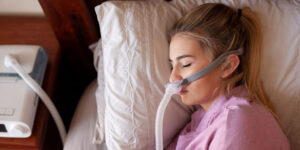Bruxism: What Is It?
Bruxism, an often underestimated disorder, can have significant repercussions on health and well-being. It is characterized by the involuntary grinding or clenching of teeth, usually during sleep. Although sometimes perceived as a harmless habit, this disorder can lead to long-term consequences on oral and general health.
In this article, we will examine the definitions, possible causes, scientific perspectives, and solutions for managing bruxism. We will also explore possible links between bruxism and other sleep problems, such as snoring.
Understanding Bruxism: Definition and Types
According to the American Dental Association (ADA), bruxism is a parafunctional activity involving involuntary movement of the teeth outside normal functions such as chewing or swallowing. There are two main types of bruxism:
- Daytime bruxism: Occurs when a person clenches their teeth while awake, often in response to stress or concentration.
- Nocturnal bruxism: An involuntary and repetitive activity of the masticatory muscles that occurs during sleep. This is the most common and often the most problematic form.
Possible Causes of Bruxism
Despite decades of research, the exact causes of bruxism remain unclear. However, scientific studies highlight several potential risk factors:
- Psychological FactorsStress, anxiety, and other emotional disorders are often associated with bruxism. A study published in the Journal of Oral Rehabilitation in 2020 showed that individuals facing chronic stress were more likely to suffer from nocturnal bruxism.
- Sleep DisordersBruxism is sometimes linked to other sleep disorders, such as obstructive sleep apnea (OSA). Micro-awakenings caused by apneas can lead to teeth grinding.
- Neurological and Genetic FactorsSome studies suggest a genetic predisposition to bruxism. Additionally, neurological disorders such as Parkinson’s disease or side effects of certain medications (like antidepressants) can promote this disorder.
- Anatomical ProblemsPoor dental occlusion or dysfunction of the temporomandibular joint (TMJ) can also contribute to bruxism.
Consequences of Bruxism
Bruxism can have various repercussions on both oral health and general well-being:
- Oral Health
- Wear of teeth, potentially leading to cracks or fractures.
- Increased sensitivity to hot, cold, or sweet foods.
- Pain in the jaw or masticatory muscles.
- Musculoskeletal ProblemsBruxism can cause chronic pain in the jaw, neck, or shoulders.
- Impact on Sleep QualityIndividuals suffering from nocturnal bruxism often report morning fatigue, headaches, and daytime sleepiness.
Scientific Approaches to Understanding Bruxism
Recent research has provided better insights into the underlying mechanisms of bruxism:
- Link with Neurotransmitters Neurotransmitters like dopamine play a crucial role in motor control. An imbalance in these chemicals could contribute to the development of bruxism.
- Sleep Micro-Arousals Studies have shown that episodes of bruxism during sleep are often preceded by micro-arousals, brief awakenings that activate the autonomic nervous system.
Solutions to Manage Bruxism
Managing bruxism requires a multidisciplinary approach:
- Stress Management Since stress is a significant factor, techniques such as meditation, yoga, or cognitive-behavioral therapy can help reduce episodes of bruxism.
- Dental Appliances The use of mouthguards or splints can protect teeth from wear and reduce muscle tension.
- Medication In some cases, muscle relaxants or botulinum toxin injections may be prescribed to reduce muscle activity.
- Treatment of Associated Sleep Disorders If bruxism is linked to sleep apnea, treating the apnea can reduce or eliminate teeth grinding episodes.
In conclusion, bruxism is a complex disorder with multiple causes and significant consequences. A comprehensive understanding and appropriate management can improve both oral health and overall quality of life.











